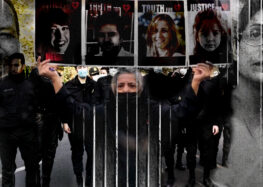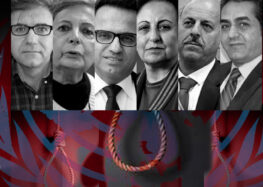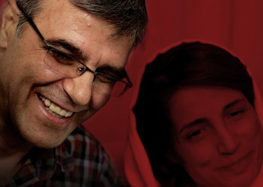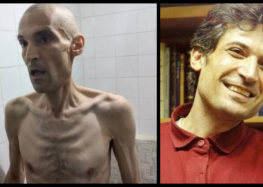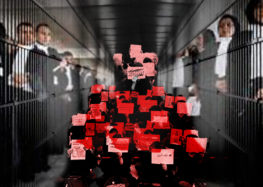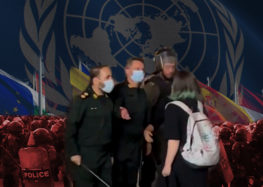A Conversation with the Director and Producers of the New Documentary, “Nasrin”
Nasrin, a new documentary scheduled for its world premiere on October 1, 2020, tells the important and fascinating story of Nasrin Sotoudeh, the imprisoned human rights lawyer who has endured years behind bars for defending basic civil and political rights in Iran. The Center for Human Rights in Iran (CHRI) recently spoke with Jeff Kaufman, director, producer and writer of Nasrin, and Marcia Ross, producer of the film. Following are extended excerpts from the conversion CHRI had with Jeff and Marcia.
CHRI: The Center for Human Rights in Iran is pleased to welcome Jeff Kaufman and Marcia Ross. Jeff is director, producer and writer for the new documentary Nasrin and Marcia Ross is producer of the film, which tells the story of the Iranian human rights lawyer, Nasrin Sotoudeh. Nasrin is currently behind bars at Iran’s Evin Prison, sentenced to 38 years’ imprisonment for her peaceful work as a human rights attorney—12 years of which she must serve before becoming eligible for parole. Among her charges were “encouraging prostitution” for advocating against compulsory hijab and defending citizens’ rights to peaceful dissent. Germany’s largest professional association of judges and public prosecutors recently awarded Sotoudeh its human rights prize, calling her a “symbol of the Iranian civil rights movement” and she was also the recipient of the 2012 European Union’s prestigious Sakharov Prize for freedom of thought for her human rights work. Nasrin has been called “the Nelson Mandela of Iran.” Welcome Jeff and Marcia, we are so pleased to talk with you about this wonderful and important documentary that you’ve made, Nasrin.
JK: Thank you, it’s a pleasure to be here, especially because it’s the Center for Human Rights in Iran, which has been such a great colleague in this process.
CHRI: There are many human rights defenders and even lawyers that are imprisoned for their human rights work, what drew you to Nasrin Sotoudeh?
JK: I’ve long been inspired and motivated by human rights. Since I started doing documentaries, life took me in a direction of doing quite a number of films about Iran. The more I connected to Iran, the more I came to have a deep appreciation of the Iranian people, realizing that just as the American people should not be confused with the American leadership, the same is true in Iran. I did an earlier film with Amnesty International about the persecution of the Baha’i faith in Iran called Education Under Fire, and one of the people I got to know who was featured in that film was Hadi Ghaemi, who runs and founded the Center for Human Rights in Iran. In that film, one of the things I was really touched by was repeated stories from Bahai’s in Iran [a persecuted religious minority] about how Muslim neighbors and friends risked everything to help them in times of need. I thought that was a remarkable story and I wanted to come back to that again. There is no one who represents stepping outside the comfort of your own life to help others on every level better than Nasrin Sotoudeh. She’s been the champion not just of religious minorities, children’s rights, women’s rights—she’s in prison now on a hunger strike demanding the release not of herself but of others from prison. She’s not just the Nelson Mandela of Iran, she’s really the Nelson Mandela of our time. So that’s what led me and Marcia to want to tell her story.
CHRI: Over the course of working with this exceptional woman, what struck you most about her personally?
MR: Her balance between being a mother and a wife and her political work was fascinating to me. When she’s with her children, she’s so much the mother, you can see that she’s not distracted. One of my favorite scenes in the movie is when she’s walking Nima [Nasrin’s son] home from school and they’re holding hands and she’s picked him up and he’s wearing a backpack and it’s such a universal moment of mother and child that you would see anywhere in the world. I also was really taken with this idea, as a mother myself, of being able to choose this sort of higher calling and do this in spite of the fact that you’re also a mother with young children at home that need you. She is doing this for her children even if it means she’s sacrificing being with her children. Based on getting to know the children as we have, [we saw] how well-balanced they are and how well parented they are by their father and their mother and their family. It’s very difficult what they’re living with but at the same time they seem really well-balanced kids. People who are willing to put the greater good before their own needs to make the difference in the lives of other people are very intriguing to me, and she is that.
CHRI: Her 20-year-old daughter Mehraveh has since assumed a very high profile herself defending human rights. She was recently arrested and temporarily detained, and of course Nasrin’s husband Reza Khandan has been a tireless advocate for human rights in Iran and for Nasrin’s freedom. What sense did you get of this very special family and the extraordinary sacrifices that actually all of them have made?
JK: It’s a strange thing being a documentary film producer, because it gives you a pass to jump into people’s lives and find out who they are. And sometimes people are disappointing. Sometimes people who are famous or successful are not the human beings you want them to be. And one of the really moving things about getting to know Nasrin and Reza and Mehraveh and Nima and their family and friends is that she’s just the real thing; they are wonderful people. Talking to them in the midst of a crisis that most of us can never even imagine and seeing their reality and their humanity is so moving. And I think that’s one of the things that makes Nasrin such a compelling subject for a film. She’s not just a zealot, she’s also just as much a saint, just a very real human being, with one of the greatest smiles I’ve ever seen and then also one of the most ferocious gazes I’ve ever seen, and I think all that in one person is pretty impressive.
MR: I’d like to add something about Mehraveh [Nasrin’s daughter]. She’s a very well-balanced young woman. She’s pursuing her own goals in life as an artist and I think she feels very free to do that. I don’t feel that she feels a compelling need to follow in her mother’s footsteps. Yet at the same time, what I’ve seen and am so impressed by is that they do admire their mother and she as a young woman really appreciates her mother’s strength and her mother’s will and willfulness. She has a great appreciation for what her parents have imparted to her but at the same time there’s no feeling like she has to be [the same as] her mother. I think that’s just a wonderful gift that both Reza and Nasrin have given to their children.
JK: One of the things I’m struck by with Mehraveh is that this isn’t necessarily a calling that she was eager to jump into, but events and her sense of character determined for her that she had to do something.
CHRI: One of Iran’s most distinguished human rights lawyers is a woman, and women are quite prominent among human rights defenders in Iran. What does this say to you about the women of Iran and their role in the broader struggle for basic political and civil rights in the country?
MR: It’s very interesting about Iran because the women were often the more educated. Like Shirin Ebadi, she was a judge right out of law school and then after the [1979 Iranian] revolution she lost that position and had to report to men, and that’s a tragic waste of the talents of these women. I think that Nasrin’s work is hopefully restoring women’s place in that society as leaders, educated people, people that make a difference.
JK: Yes, and the other thing is that when we make documentaries, we often have a central character and we know what that story is, but we want other themes and ideas to come out naturally through that, and of course you have to have someone who is compelling to make that happen but one of our goals for the film is we wanted through Nasrin and through other people like Shirin Ebadi to tell the remarkable story of the women’s rights movement in Iran. And it really goes back a hundred years, with a lot of sacrifice and so much struggle and pushing back and yet these women keep fighting for their rights.
MR: Yes, they just don’t give up, and the things that have happened to them, the time in prison, being separated from the children—yet they never, ever give up, they’re so committed.
JK: Yes, [look at] Narges Mohammadi [another prominent, imprisoned human rights activist in Iran], who is in prison right now and is a long-time colleague of Nasrin’s. Her husband, Taghi Rahmani, who is in the film, they have two young children, he already served 14 years in prison himself, their twin kids are with him in exile in Paris, they can’t see their mother. Narges is a remarkable human being and exemplifies what other women in that country have gone through, and that’s why we need to support them and support institutions that support them.
CHRI: Can you tell us about some of the biggest challenges you faced doing this documentary?
JK: The greatest challenge was worrying about the people in the film in Iran, knowing the risk they were putting themselves in to do this, and that’s something we had many conversations about because we said, even when we were almost ready to start editing, “We’ll stop this right now if you feel this is too much of a risk for you.” But we were always encouraged to keep moving forward. I think there is a responsibility to step outside oneself, to fully tell other people’s story, and we wanted to get it right and we wanted to have a balance between politics and culture and each individual’s story, so I think that’s the big weight on it, and then trying to get it out to the world, which is where we are now.
CHRI: Do you think there will be strong positive international reception to this film given the highly politicized climate of anything regarding Iran?
JK: I hope so. We’re confident that the way Nasrin presents herself and the others in the film, if people give it a chance, we’ll break through barriers.
CHRI: What does Nasrin herself hope will be achieved by this film?
JK: We can’t speak for Nasrin, but we’ve talked a lot about her goals and it’s been really remarkable how encouraging she and others from the family have been about the film itself. She always wanted this documentary to lift as many people as possible. She realized that she was going to be the conduit for that, but for her it’s never been about herself. She was really inspired by Mahatma Gandhi, Nelson Mandela, those people [and] their example percolate around the world and her hope and our hope is that it will create new interest in human rights around the world. She just won this German judicial award for her activism, and what did she do from prison? She didn’t just say thank you, she dedicated it to Iranian prisoners on death row—one who sadly was just executed. And that’s Nasrin in a nutshell: Attention is coming to me? How can I use it for others? So that’s what we want to do.
MR: Like the previous hunger strike [Nasrin] was on, it was to get the elderly out of the prison, including her cellmate, and this is the same concept, she’s trying to get freedoms for others. She always talks in the “we,” it’s never the “I.”
CHRI: Can you tell us when the film will be released and what your plans are for the film?
MR: The film will be seen for the first time at the Boston Globe documentary film festival GlobeDocs, which will be from October 1 through October 12, 2020. Right now, all festivals are virtual and we’ll be posting information on the website for the film (www.nasrinfilm.com) and on Facebook page for the film (www.facebook.com/nasrinfilm) which I hope people will follow because everything will be listed. You can buy tickets online and you’ll be able to watch the film and the post-screen TalkBack all online. That will be followed by several other film festivals, and we’re working on an impact and outreach campaign, and we already have about a dozen events set up including university screenings, organizational screenings, and also our Call to Action campaign to sign the petition that’s out there now with Penn International demanding Nasrin’s immediate release. Then after the first of the year we’ll get into the commercial release of the film, it will be available on broadcast and streaming domestically and internationally, and we’re planning for people in Iran to be able to get it any way they can.
JK: There will be dozens of screenings, including one with the Center for Human Rights in Iran, and, in this strange COVID world, rather than people going into a small room we’ll be able to join each other online for conversation and that I think will be really gratifying as well.
MR: [Going] virtual is a real change in how we do things but it allows for people from the film and scholars and journalists and other people that might not have been able to fly to the location to participate in the city where the festival is. We’re going to be able to have that participation and those voices as part of our events, which under normal circumstances would not be possible.
CHRI: Jeff Kaufman and Marcia Ross, thank you so much for speaking with the Center for Human Rights in Iran and we wish you the best of luck with this very wonderful and important film that you’ve made, Nasrin.
JK and MR: Thank you, it’s been a pleasure!


